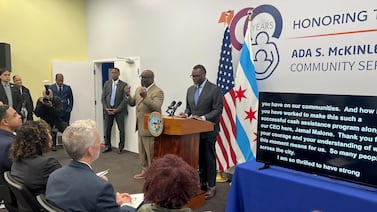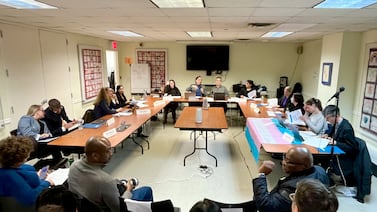A new law that allows school districts to use support staff as substitute teachers drew ire from many who envisioned bus drivers and cafeteria workers suddenly taking on a role for which they had no preparation.
But three months after the law was enacted, those fears don’t appear to have been realized.
Chalkbeat Detroit and Bridge Michigan reached out to dozens of superintendents around the state. Only two districts – Paw Paw and West Bloomfield – regularly take advantage of the new law that temporarily allows school staff members to cover classrooms even if they wouldn’t otherwise be qualified to substitute teach.
Both are using paraprofessionals, who assist teachers and already are familiar with students and with classroom routines.
Passed in December, the new law expires at the end of this school year. It temporarily allows school staff members to sub even if they don’t have a single college credit. They need only a high school diploma or equivalency certificate.
Ordinarily, substitute teachers must have an associate degree, 60 college credits, or, in the case of career and technical courses, subject-matter expertise. Substitutes who are not school staff members still have to meet those requirements.
The struggle to find subs is not new, but it worsened during the pandemic when teacher retirements spiked and coronavirus exposure forced staff to quarantine. The nationwide problem prompted some districts to temporarily close and others to increase substitutes’ pay. Legislatively, many states joined Michigan in loosening qualification requirements for subs.
West Bloomfield superintendent Gerald Hill said Michigan’s new law has provided flexibility that’s especially needed now, when other would-be subs are hesitant to enter school buildings for fear of getting COVID from unvaccinated children.
He prefers to use substitutes with at least 60 college credits, but a few times recently when there weren’t enough he has turned to less-educated paraprofessionals on staff in his 4,500-student district north of Detroit.
West of Kalamazoo, Paw Paw Public Schools Superintendent Rick Reo said the new law is helpful but isn’t enough to make a big difference when shortages of both teachers and subs are so severe.
“We’re just putting a Band-Aid on a really big wound. We’ve got a big issue here that we need to get solved,” Reo said.
Lawmakers appear to be trying. On Tuesday, the Senate Committee on Education and Career Readiness advanced a bill that would allow former school employees to begin substitute teaching four months after retirement. The bill also would remove financial penalties for returning retirees who earn too much. Under current law, they must wait a year and forfeit pensions and health care benefits for every month their substitute pay exceeds one-third of their former compensation.
Superintendents hope the measure passes the full Senate and House.
“That would be wonderful,” Reo said. “I have retired teachers who are like, ‘What can I do? How can I help?’ but they have to wait.”
Since the new law passed, Hancock Public Schools, a 650-student district in the northernmost region of the Upper Peninsula, has been using paraprofessionals to substitute rarely and, even then, only for one or two class periods at a time, said Superintendent Steve Patchin. Most of the time, those paraprofessionals have enough college credits to qualify as substitutes even without the new law, Patchin said.
Administrators of the Au Gres-Sims School District on the shore of Lake Huron don’t plan to use staff members as subs, but might in a true emergency when there are no other options. “Even then,” superintendent Chris Ming said, “the conditions to do so will need to be right.”
Other superintendents said they have no plans to use otherwise unqualified staff to substitute teach.
“While I believe we have many support staff who are more than capable of managing a group of students, it is disingenuous to expect that they provide a day of instruction in accordance with what the state expects every other day of the school year from highly qualified, certified teachers,” said Robert D. Livernois, superintendent of Warren Consolidated Schools just north of Detroit.
Detroit Public Schools Community District, the state’s largest, also has no plans to use otherwise unqualified school staff to sub.
It would have been a better use of legislators’ time to pass laws that school administrators want, said Lou Glazer, president of Michigan Future, an Ann Arbor-based nonpartisan think tank focused on education’s role in bolstering the state economy.
“It sounds like they just passed a bill that no one is really using,” he said.
Glazer said policy makers, school administrators, and state education officials should come together to develop a set of legislation solutions that will truly alleviate the substitute shortage.
The state Department of Education opposed the law in December along with most Democratic lawmakers. Some said, in impassioned floor speeches, that it would diminish the quality of education and pull staff from cafeterias, bus garages, and school libraries that are already stretched thin.
The latter is a particular concern, said Paul T. Shoup, Superintendent of Mason County Eastern Schools, a 400-student district on the western part of the Lower Peninsula. Shoup hasn’t used support staff to substitute teach. If he had it would have created a void in other areas where they are needed, he said.
Beaver Island Community School, a remote one-building district with just 58 students, has occasionally called on the school secretary to fill in. She is a retired school nurse with a bachelor’s degree, so she would have qualified without the new law.
Still, the law is a helpful backstop, said Wilfred Cwikiel, Beaver Island’s superintendent and principal. It ensures learning continues even when traditional substitutes aren’t available, he said.
“It helps knowing that if I need to, I could ask our cook, the person who runs the kitchen, to stay on a couple hours to handle a classroom,” Cwikiel said. “When we have to cover a classroom, it’s wonderful to have the flexibility.”








